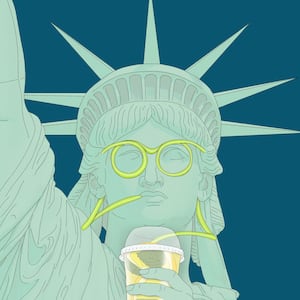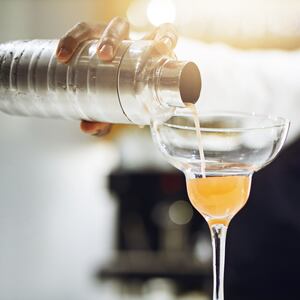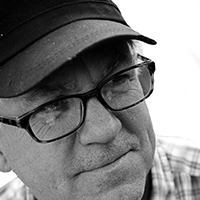It’s the worst of times to publish a field guide to American bars and drinks, and it’s the best of times.
Well, obviously, it’s a dreadful time to release such an overview. The world has been upended since March, with the pandemic shuttering many bars temporarily and far too many permanently. Who needs a guide to bars that may or may not reopen?
But I would argue it’s also the best of times for the release of Brian Bartels’ brand-new The United States of Cocktails: Recipes, Tales, and Traditions from All 50 States, since it can serve as an inadvertent snapshot of what was arguably peak modern cocktail culture. It was a vibrant period in which drinking establishments were having a moment in the spotlight, with bar owners and bartenders displaying colossal amounts of creativity in crafting public spaces and sophisticated drinks. The book is a cheery, eclectic and ambitious celebration of that movement from Florida to Alaska and all points in between.

Bartels, who is a veteran New York bartender and author of The Bloody Mary: The Lore and Legend of a Classic Cocktail, researched his new book last year and submitted the manuscript well before COVID started its grim march across the Earth. Every state gets a chapter, and within each is a brief essay about what makes the area distinctive in terms of drinking, followed by pithy, entertaining subsections that look at “State Spirits (or beverage),” “Bucket List Bar,” “Cocktail Bar,” and “Oldest Bar.” Each chapter is garnished with a couple of cocktail recipes from notable bars, and are served up with bite-sized tidbits of random but entertaining information (labeled “Bar Snacks”).
He got the idea for the project when working with the BarSmarts education program, which is sponsored by liquor conglomerate Pernod-Ricard and offers daylong training sessions for bartenders in cities around the nation. In his travels, he grew intrigued by local cultures of drink that had persisted in an age of chain restaurants and creeping homogeneity. “Our world of cocktails has such stories and history to it, and it led to a curiosity about how we evolved as human beings,” he says.
Bartels visited 44 of the 50 states in compiling information for the guide, and cast a wide net to turn up treasures, like the fondness for “red beer” (beer and tomato juice) in Nebraska, and the Montana predilection for the phrase “ditch,” meaning “with water,” as in a “whiskey ditch.”

His selection of bucket list bars is eclectic, with entries like the Full Throttle Saloon in Sturgis, South Dakota, or Maxine’s Tap Room in Fayetteville, Arkansas, where the eponymous Maxine (who died in 2006) “would deliver her farewell message for last call by microphone: ‘You have ten minutes to drink up and get the hell out.’”
“You can do as much research as you want, but nothing replaces the magic of going to a place and asking a bartender, if you weren’t working here tonight, where would you go?” Bartels says.
Even pre-COVID, Bartels was concerned about the erosion of some long- standing bar traditions. He often felt that the modern bar community tended to overlook the past in the pursuit of the new, and while researching he often sensed history slipping away. He fears many ambitious bartenders have showed up in new locales without knowledge of local history and traditions, “and with a little too much bravado.”
He was encouraged, however, by the craft spirits scene—hundreds of new distilleries have sprouted in the past decade or two, and he found the proprietors were often leading proponents of local traditions in spirits and drink, introducing them to bartenders as they sought to establish their local bona fides.
Bartels himself departed New York last year and moved back to his native Wisconsin, with plans to open a bar in downtown Madison a block from the State Capitol. The January opening was pushed back to March for the usual reasons of construction delays and licensing, but then came, well…you know. “We were a week of two away from opening and lo and behold and the world started spinning, and we had to put things on hiatus,” he says.
He and his partners finally opened the Settle Down Tavern on May 26, with the pandemic in mid-stride. The meticulously designed and built-out bar space was left all but empty, and he’s had to pivot to focus on take-out food. “Since we opened nothing has felt real,” he says. “There’s no casual conversation. You can’t just say, how’s your world, because, well, we’re living in different times.”
Madison’s city government has been helpful in carving outdoor spaces for bars and restaurants to move patrons outside—the block on which Settle Down is located was closed to cars and has become a new plaza, dotted with distanced tables to allow his and adjacent restaurants to spill outdoors. They’ve managed to make the best of the situation.
“I think we’re all vulnerable right now,” Bartels says. “And I especially worry about anywhere that doesn’t have warm weather.”
His is a bittersweet book. It’s a wonderfully illustrated celebration of bars and cocktails from coast to coast—design-wise, it’s reminiscent of the classic, art-deco-inflected Savoy Cocktail Book published in 1930—and serves as an excellent guide to good times in the before times. But a handful of bars he’s written up have since been permanently shuttered—Pegu Club in New York, McCrady’s in Charleston—and it’s hard not to be wistful about what’s been lost.
When New Orleans was nearly lost to Katrina’s floodwaters and poor engineering 15 years ago, one upside was that New Orleanians and Americans alike discovered a new and profound appreciation for the city, brought home by the realization that what they long took for granted could easily vanish.
We can hope for much of the same with the bars that have been lost or nearly lost, buffeted by inept government response on the virus and its aftermath, and largely left to fend for themselves. While deep-pocketed chains will likely be back, we can only hope that the near-death experience of independent bars and restaurants will bring home the peril of assuming what we once had will last forever.
The United States of Cocktails isn’t just a road trip through another time and a glorious look back. Turns out, it’s also a roadmap for the future, offering a route to find our way back.



